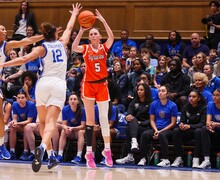Syverud says SU prioritizing student safety ‘over academic freedom and free speech’ amid Israel-Hamas War
Daily Orange File Photo
Chancellor Kent Syverud said Syracuse University's priority amid the Israel-Hamas war is student safety at the University Senate meeting. He said that while academic freedom and freedom of speech are important, student safety overrides this.
Get the latest Syracuse news delivered right to your inbox.
Subscribe to our newsletter here.
During Wednesday’s University Senate meeting, Chancellor Kent Syverud said Syracuse University administrators are prioritizing student safety over free speech and academic freedom because of the Israel-Hamas war.
“Our first priority has to be to all of our students. That’s not just the students we agree with or disagree with, but all of our students, and for me that responsibility to our students comes first, including over academic freedom and free speech,” Syverud said.
While he said he still believes academic freedom and free speech are important to maintain, he said the university must act when the safety of students is “significantly threatened.” Along with Syverud, Provost Gretchen Ritter also spoke about the war and Nov. 9’s pro-Palestine protest, saying that the campus is still upholding academic freedom. Conversations regarding the war took up much of Wednesday’s meeting.
Toward the beginning of the meeting, Syverud called the Israel-Hamas war a “humanitarian crisis,” saying that innocent Palestinians are being killed. He also acknowledged how many people across the United States have been affected by the war directly and indirectly, whether by losing loved ones or receiving threats.
At the Senate’s last meeting, Syverud said he wants to focus on inclusivity amid the war because of the wide range of views across campus.
“Just to be clear, students are frightened and angry. They are frightened about antisemitic acts. They’re frightened about hostility to anyone who speaks up for Palestinians in Gaza,” Syverud said Wednesday. “They’re frightened about perceptions that law enforcement and the university are taking unfair sides or taking unfair steps.”
Vice Chancellor Ritter said many students have reported faculty and staff to either be disciplined or fired for expressing their opinions in the classroom, something she said the university has not and will not adhere to. Ritter acknowledged calls for bias complaints filed against faculty to be dropped, but said bias complaints will be investigated according to the university’s established process.
“Indeed, many of us administrators, deans and staff, have spent countless hours these last few weeks defending our faculty and departments, and we will continue to do so,” Ritter said. “But all of us, faculty included, be mindful of how we engage with our students as we endeavor to create safe and inclusive learning environments.”
Senator Benjie Tettah, a doctoral student in the S.I. Newhouse School of Public Communications, asked why the administration decided at the “last hour” to cancel a Middle Eastern studies scholar teach-in event scheduled for Oct. 31. Tettah said the event was supposed to be a “learning experience” for students.
In response, Ritter said one of the organizers of the event had gotten in touch with the administration voicing concerns about the event’s safety after saying they received threatening messages. As a result, the administration believed the event would endanger attendees’ safety.
Mahder Habtemariam Serekberhan, a political science Ph.D. student and member of the African Graduate Students Network, said that after canceling the event, organizers didn’t have the alternative of hosting a Zoom call, which she said contradicted the administration’s reasoning for canceling because of “safety concerns.”
“The administration did not even give organizers the opportunity to take this event online. This is an academic censorship process. It’s not necessarily a safety process. If it was a safety protocol, we could have easily made this a Zoom call, but that was not even put on the table for organizers,” Serekberhan said.
Some senators also addressed the campus-wide email the administration sent out following the pro-Palestine protest on Thursday. Senator Radha Kumar, an associate professor in the Department of History, questioned the administration’s decision to involve the FBI in response to the protest and said the response seemed “disproportionate.”
Ritter responded by acknowledging the protest was peaceful and appropriate, but the administration received a video of a “certain speaker” at the protest calling out Jewish organizations on campus by name. Ritter said the administration went to local law enforcement and the FBI to get any background information on any bias-related incidents or crimes SU officials should be concerned about.
The meeting also covered updates on the Committee on Curricula, the Committee on Library and the topic of academic freedom. But efforts to address these topics were repeatedly interrupted by senators to further discuss the Israel-Hamas war.
“I’m wondering if we can move to shift the agenda to have a discussion about the atrocities and the massacre that’s happening so that we might be able to come to a consensus as a senate about what our communications are, what our limitations are and what our freedoms are,” said Senator Biko Mandela Gray, an assistant professor in the Department of Religion.
Senator Thomas Keck, a professor in the Department of Political Science, said while the situation is very important, the agenda was made before the meeting and therefore should go according to plan since there is other “important senate business” that the Senate wants to get to.
The motion to shift the agenda toward continuing to speak about the Israel-Hamas war was opposed by the majority of the Senate. At the end of the meeting, senators had a few minutes to voice any last statements. During this time, senators and other participants reverted back to the topic of the Israel-Hamas war, urging more conversation surrounding the topic on campus.
Jordan Beasley, a senior at SU and president of the Syracuse Black Student Union, said he wants to see more support for Palestinian students on campus.
“It is extremely sad that once again that this university fails to employ the measures of diversity, equity and inclusion,” Beasley said. “Please do a better job in the future because this is sorry and this is sad.”
CORRECTION: A previous version of this article stated that Provost Gretchen Ritter said all bias complaints filed against faculty in classrooms would be dropped. This was incorrect. Ritter said bias complaints will be investigated according to established policies. The Daily Orange regrets this error.
Published on November 15, 2023 at 10:58 pm
Contact Roxanne: rmboychu@syr.edu





